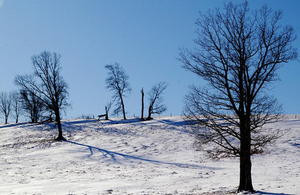PHE response to ONS Excess Winter Mortality statistics
PHE comments on the Office for National Statistics (ONS) Excess Winter Mortality in England and Wales statistics, published today.

snow setting
PHE’s Cold Weather Plan aims to prevent avoidable harm to health, by alerting people to the negative health effects of cold weather, and enabling them to prepare and respond appropriately.
The plan was published in October by PHE in collaboration with the Department of Health, NHS England and the Local Government Association (LGA).
Dr. Paul Cosford, Director for Health Protection and Medical Director at PHE, said:
We normally see death rates peak during winter months and last winter we saw an unusually prolonged influenza season and an extended cold period lasting until April this year.
Many of these deaths are preventable and the Cold Weather Plan sets out a series of actions which can be taken by the NHS, social care and other agencies throughout the year, in response to forecast or actual severe winter weather to minimise any harm to health.
It’s difficult to identify a single cause when we see an increase in the number of excess winter deaths. There are a variety of contributory factors, such as poorly insulated housing and health inequalities, as well as increased influenza activity. This emphasises the importance of taking up the offer of a flu jab, to protect yourself and others from flu, if you are in an eligible group.
The Cold Weather Plan also provides other advice on ways to keeping warm and well this winter, such as:
- look out for friends, relatives and neighbours who may be vulnerable to the cold
- stay tuned to the weather forecast and plan ahead with supplies
- have regular hot meals and drinks throughout the day and keep active to help your body stay warm
- get financial support to make your home more energy efficient, improve your heating or help with bills
- keep warm by setting your heating to the right temperature and at least keeping your bedroom and living room warm
- have your heating and cooking appliances checked regularly
- wear a few layers of thin clothing rather than one thick layer, and when you need to go outside wear shoes with slip resistant, good grip soles
A PHE Winter Health Watch website also brings together PHE’s weekly monitoring of winter-related illnesses and deaths published each Thursday at 2pm.
Notes:
- Read the ONS excess winter mortality report.
- PHE’s Cold Weather Plan was developed in partnership with NHS England, the Local Government Association and the Met Office, and sets out a series of actions to be taken by the NHS, social care and other agencies throughout the year, and in response to forecast or actual severe winter weather. It also encourages local communities to support the most vulnerable in their area, such as checking on them during severe weather and offering other support.
- More information on the annual flu programme.
- The Met Office will trigger cold weather alerts from 1 November 2013 to 31 March 2014, on the basis of either low temperatures of 2°C or less, or severe winter weather (heavy snow or widespread ice) which PHE supports with public health advice. Follow #winterready (for cold weather alert levels 0 and 1) and #weatheraware (alert levels 2 to 4) on Twitter for winter health advice.
Photo courtesy Pocius via creative commons licence.